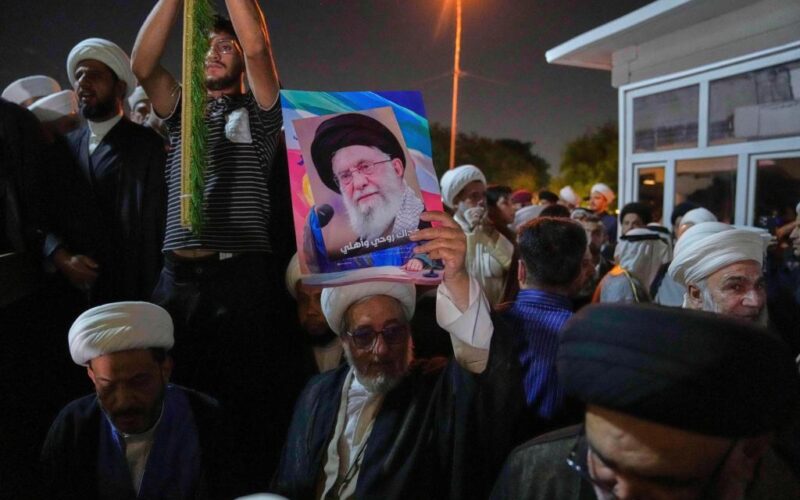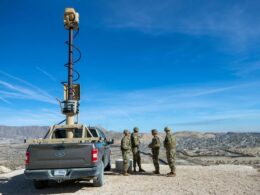By SAM MEDNICK, JON GAMBRELL and DAVID RISING
TEL AVIV, Israel (AP) — Israel and Iran exchanged strikes a week into their war Friday as President Donald Trump weighed U.S. military involvement and new diplomatic efforts got underway.
Trump has been weighing whether to attack Iran by striking its well-defended Fordo uranium enrichment facility, which is buried under a mountain and widely considered to be out of reach of all but America’s “bunker-buster” bombs. He said he’ll decide within two weeks whether the U.S. military will get directly involved in the war given the “substantial chance” for renewed negotiations over Tehran’s nuclear program.
Iran’s Foreign Minister Abbas Araghchi appeared to be en route to Geneva for meetings with the European Union’s top diplomat and counterparts from the United Kingdom, France and Germany. A plane with his usual call sign took off from the Turkish city of Van, near the Iranian border, flight-tracking data from FlightRadar24 showed. Iran typically acknowledges his departure hours afterward.
Britain’s foreign secretary said he met at the White House with U.S. Secretary of State Marco Rubio and envoy Steve Witkoff to discuss the potential for a deal that could cool the conflict.
Before his flight, Araghchi said on Iranian state television that his country was “not seeking negotiations with anyone” as long as Israel’s attacks continued, underscoring the diplomatic challenges ahead. He also accused the U.S. of collaborating with Israel, noting that Trump regularly used “we” in social media posts and interviews talking about the attacks on Iran.
“It is the Americans who want talks,” he said in comments Thursday that were broadcast Friday. “They’ve sent messages several times — very serious ones — but we made it explicitly clear to them that as long as this aggression and invasion continue, there is absolutely no room for talk or diplomacy. We are engaged in legitimate self-defense, and this defense will not stop under any circumstances.”
He added that he expected the Switzerland talks to focus only on Iran’s nuclear program, and that Iran’s missile capabilities were “for defending the country” and not up for discussion.
French President Emmanuel Macron said top European diplomats in Geneva will make a “comprehensive, diplomatic and technical offer of negotiation” to Iran, as a key response to the “threat” represented by Iran’s nuclear program.
“No one can seriously believe that this threat can be met with (Israel’s) current operations alone,” he told reporters on the sidelines of the Paris Air Show, saying some plants are heavily fortified and nobody knows exactly where all uranium enrichment is taking place.
“We need to regain control on (Iran’s nuclear) program through technical expertise and negotiation.”
Iran had previously agreed to limit its uranium enrichment and allow international inspectors in to its nuclear sites under a 2015 deal with the U.S., France, China, Russia, Britain and Germany in exchange for sanctions relief and other provisions.
After Trump pulled the U.S. unilaterally out of the deal during his last term, however, Iran began enriching uranium to higher levels and limiting access to its facilities.
Israel says air campaign will target more sites
Israel said it conducted airstrikes into Friday morning in Iran with more than 60 aircraft hitting what it said were industrial sites to manufacture missiles. It did not elaborate on the locations. It also said it hit the headquarters of Iran’s Organization of Defensive Innovation and Research, known by its acronym in Farsi, SPND. The U.S. in the past has linked that agency to alleged Iranian research and testing tied to the possible development of nuclear explosive devices.
It also carried out airstrikes targeting the areas around Kermanshah and Tabriz in western Iran, where the military said 25 fighter jets struck “missile storage and launch infrastructure components” Friday morning. There had been reports of anti-aircraft fire in the areas.
Iran did not immediately acknowledge the losses, and has not discussed the damage done so far to its military in the weeklong war.
“We are strengthening our air control in the region and advancing our air offensive,” Israeli military spokesperson Brig. Gen. Effie Defrin told reporters.
“We have more sites to strike in Tehran, western Iran and other places.”
Israeli airstrikes also reached into the city of Rasht on the Caspian Sea early Friday, Iranian media reported. The Israeli military had warned the public to flee the area around Rasht’s Industrial City, southwest of the city’s downtown. But with Iran’s internet shut off to the outside world, it’s unclear just how many people could see the message.
Damage from missiles in southern Israel
In Israel, the paramedic service Magen David Adom said Iranian missiles struck a residential area in southern Israel causing damage to buildings, including one six-story building. They have provided medical treatment to five people with minor injuries such as bruises, smoke inhalation, and anxiety, it said.
Later Friday, as Araghchi’s plane approached Geneva, Israel’s military warned of more incoming Iranian missiles and air raid sirens blared in Jerusalem and Tel Aviv.
On Thursday, at least 80 patients and medical workers were wounded in a strike on the Soroka Medical Center in the southern city of Beersheba.
After that attack, Israel’s defense minister threatened Iranian Supreme Leader Ayatollah Ali Khamenei after the Iranian missile crashed into the hospital. Israel’s military “has been instructed and knows that in order to achieve all of its goals, this man absolutely should not continue to exist,” Defense Minister Israel Katz said.
Prime Minister Benjamin Netanyahu said he trusted that Trump would “do what’s best for America.” Speaking from the rubble and shattered glass around the hospital, he added: “I can tell you that they’re already helping a lot.”
The war between Israel and Iran erupted June 13, with Israeli airstrikes targeting nuclear and military sites, top generals and nuclear scientists. At least 657 people, including 263 civilians, have been killed in Iran and more than 2,000 wounded, according to a Washington-based Iranian human rights group.
Iran has retaliated by firing 450 missiles and 1,000 drones at Israel, according to Israeli army estimates. Most have been shot down by Israel’s multitiered air defenses, but at least 24 people in Israel have been killed and hundreds wounded.
Iran has long maintained its nuclear program is for peaceful purposes. But it is the only non-nuclear-weapon state to enrich uranium up to 60%, a short, technical step away from weapons-grade levels of 90%.
Israel is widely believed to be the only Middle Eastern country with a nuclear weapons program but has never acknowledged it.
The Israeli air campaign has targeted Iran’s enrichment site at Natanz, centrifuge workshops around Tehran, a nuclear site in Isfahan and what the army assesses to be most of Iran’s ballistic missile launchers. The destruction of those launchers has contributed to the steady decline in Iranian attacks since the start of the conflict.
Gambrell and Rising reported from Dubai, United Arab Emirates. Associated Press writer Sylvie Corbet in Paris contributed to this report.
Originally Published:









